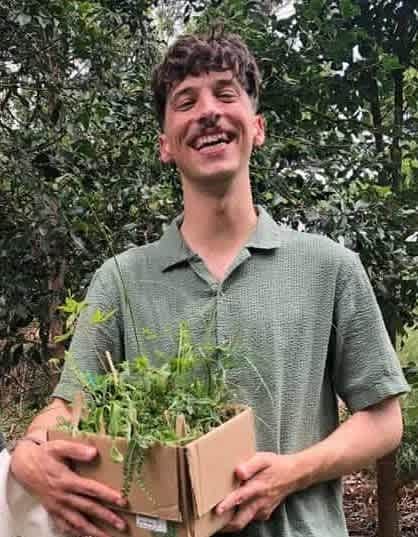You’ve heard of COVID-19, you’ve heard of the loneliness epidemic – but there is another invisible malady spreading across the Illawarra community. According to a 2023 YouthGov survey, concerns about climate change are having negative impacts on the mental health of over two-thirds (67%) of young Australians. These concerns were amplified by the 2019/2020 Black Summer bushfires, which affected many South Coast residents.
“Eco-anxiety” can be defined as fear resulting from an acute awareness of the risks raised by global ecological issues. This can have profound effects on the disposition, lifestyle choices, and wellbeing of those affected.
Young people are disproportionately affected by eco-anxiety because they are highly vulnerable to climate impacts, with high temperatures, rising seas and natural disasters expected to wreak havoc on communities and economies by the end of this century. They are also more environmentally conscious than the generations before them, which is both a gift and a curse.
To get an idea of how eco-anxiety affects young people in the Illawarra, I asked some friends to provide a short statement on how it has affected their lives, careers and wellbeing.

Sinead Coghlan, Aged Care Nurse
Between the climate and the cost-of-living crisis, the current state of this world has made me decide that I cannot have children. I personally cannot justify bringing an innocent life into the world where basic rights such as housing, food and clean water are all at risk as the planet warms and politicians turn their backs. Global warming is a crisis that will inconvenience the rich and healthy, but devastate our children, our elders, the differently abled and the poor. Politicians aren’t thinking about us as they cut community funding.

Carly Jacobsen, Diver & Marine Scientist
I struggle with the best of imperfect solutions. I worry when I go to the store and have to choose between sustainable packaging or cheaper bulk items because of the cost of living. If electric cars are better or if environmental damage during their production is worse than fuel-powered cars. Being climate conscious is now a luxury that many young people can’t afford. There are often no cheaper sustainable options, and those who can afford them do not do enough. Doing nothing adds stress and guilt as natural disasters continue to affect our lives through housing, food access and critical resourcing. It often feels like a lose-lose situation, where we must keep trying, despite feeling like the changes we make aren’t enough.

Corey Young, Horticulturist
I work with Australian native plants, often with species being pushed out of their ecological niches by climatic changes. With no other suitable habitats available to them, we are quite literally terraforming our planet faster than its inhabitants – including us – can change with it. Climate change is a fundamental threat to our collective futures. Fear of this threat is heightened by seeing only achingly slow or piecemeal changes in policy, which frustrates our ability to imagine a brighter future.

Hannah Mercer, Workforce Strategy Specialist
Working in the emergency management industry, I hear about increasingly frequent and severe disasters. When they threaten things we hold dear, the psychological repercussions concern me. The Northern Rivers community has experienced compounding trauma following recurrent flooding. During Black Summer, Indigenous peoples’ trauma was intensified by culturally inadequate support, and destroyed cultural sites. First responders face increased burnout and exposure to stressors. What does that mean for attracting and retaining people to work in these increasingly critical roles? Youth climate anxiety is escalating. With an already-strained mental healthcare system, I’m worried about how we’ll manage it.
'Feeling afraid is rational'
What differentiates eco-anxiety from common mental disorders is its focus on real (rather than psychosomatic) issues that may actually be “as bad as you think”. It is a symptom of systemic problems with environmental management, which have prevented the global community from meeting important climate and conservation goals that could have prevented us from overstepping six out of nine planetary boundaries, which define a safe operating space for humanity. Confronted by this reality, feeling afraid and unsafe is perfectly rational.
The fact that eco-anxiety is grounded in real issues makes it all the more challenging to deal with, because our current mental health support systems are set up to rationalise mental health issues as functions of personal history and beliefs, rather than context. This means that there is limited support available for young people struggling to come to terms with their uncertain futures.
One of the most troubling consequences of the eco-anxiety epidemic is the way it is halting environmental activism. Young people can be powerful forces for change, and youth-led organisations like the Australian Youth Climate Coalition and Ocean Youth have been important advocates for climate and biodiversity policies that support intergenerational justice.
Despite the fact that over 77 percent of young Australians want stronger government action on climate change and believe this would be beneficial to their mental health, eco-anxiety is preventing many young people from taking action. There are two main reasons for this. Either moral disengagement allows victims to cope through selective attention, displacement of responsibility and delusional optimism; or victims are overwhelmed by the magnitude of climate change, leading to feelings of powerlessness and resignation.
With so many young people paralysed by fear of the future, how do we get out of this rut that we’re in?
The government has an important role to play in both driving climate action and supporting community initiatives like Blue Minds, which is the result of a partnership between Surfers for Climate and The Good Human Factory tackling eco-anxiety to mobilise youth for ocean action through free workshops for schools and tertiary institutions.
Illawarra businesses and community groups can fight eco-anxiety by facilitating youth participation in nature-based solutions and climate action, especially through empowering social media engagement.
If you are affected by eco-anxiety, like Hannah, Sinead, Corey, Carly and I, then please know your concerns are valid. It takes great courage and determination to break free from the silent majority and take action against issues that are so utterly overwhelming. However, your voice is important, and we need you in the fight.
The Climate Council offers some great tips, tools and resources that will help you channel your concerns into action.
Sources
- Youth mental health and climate distress
- Eco-Anxiety and the Responses of Ecological Citizenship and Mindfulness
- Eco-Anxiety and Psycho-Terratic Paradigms of Practice: A View From Australia
- Hope, Coping and Eco-Anxiety: Young People’s Mental Health in a Climate-Impacted Australia
- Earth beyond six of nine planetary boundaries





